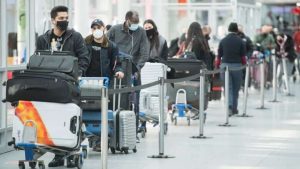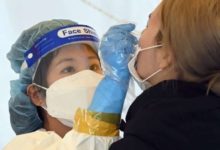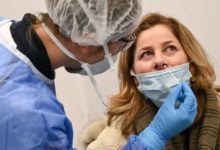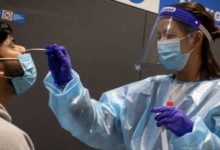Federal government lists COVID-19 testing services abroad after new rule strands many travellers

Transport Canada is offering more details this week about where travellers can get a COVID-19 test abroad — and what happens if they’re caught using a fake one — after a new testing rule for passengers flying to Canada caused widespread confusion and anxiety.
The new government policy, which took effect Jan. 7, requires that all air passengers five years and older provide documentation of a negative laboratory polymerase chain reaction (PCR) or loop-mediated isothermal amplification (LAMP) test no longer than three days before flying to Canada.
Some travellers have struggled to find legitimate laboratory tests because the government did not initially offer a list of locations where the tests could be obtained.
“There has been a great deal of confusion among passengers in terms of their obligations,” said Mike McNaney, president and CEO of the National Airlines Council of Canada. “People have been showing up … unaware that they needed to get the test, or were unable to get a test, or perhaps did get a test, but it was the wrong test.”
Five days after the implementation of the new rule, the federal government launched a website for passengers travelling to Canada that lists accredited testing sites in some countries.
That happened too late to help Todd Warren, who was in the Dominican Republic with his three teenage children when the testing rule was introduced. With no guidance from the government, he said, he was left scrambling to find a legitimate testing service.
Bogus tests, high prices
“It was a bit stressful when we were down there,” Warren told CBC News via FaceTime from his home outside Ottawa, where he is waiting out his 14-day quarantine.
Warren said that when news emerged of the new COVID-19 testing rule, he started to see local people taking advantage of the situation by selling fake tests on the beach for about $3 to $5 US.
“I guess word on the street was that this was very profitable,” he said. “So they were telling their friends, and you saw people all over the beach with … laptops.
“There was no testing done. So basically it was a template, a PDF file that had where you just gave them your name and that was it. They would email it to you.”
He said he eventually found legitimate tests at a clinic — but the prices fluctuated.
“So they started off, I don’t know the exact number, but it was around $1,000 and we got it down to $79. And he said he was giving us a deal because there was four of us,” said Warren.
“We got lucky there. The people that went before us actually ended up spending $1,500 and they didn’t know that they were able to negotiate the price.”
Warren and his kids received their negative test results just hours before their flight home departed. Others haven’t been so fortunate.
Hundreds of passengers left behind
WestJet reports that, in the first four days after the federal government announced the new testing rule, it refused to board 363 travellers because some had paid for illegitimate tests, some hadn’t obtained tests at all and some had failed to get their testing done within the required three-day window.
Air Transat said it refused to board 148 passengers over those four days due to problems with testing, while another 300 people simply failed to check in for their flights.
CBC News has asked Air Canada and Sunwing to report the number of passengers they’ve refused to board due to testing problems. Air Canada said it didn’t know the number and Sunwing has yet to reply.
McNaney said that, by introducing the new rule in a rush, the government has left airlines holding the bag.
“So carriers have been working very hard to try and re-accommodate passengers to change itineraries, to change flight schedules so that they will be able to get a test completed in the time frame necessary,” he said. “And what we have also been doing is providing passengers with as much information as we can on testing locations.”
Transport Canada also has directed a warning at travellers who use fake tests, and at airlines that consciously accept those test results.
“If an air carrier suspects that a traveller has provided false or misleading information related to their test results, they are required to notify Transport Canada,” said a department spokesperson.
“Air carriers failing to comply with the requirements of Transport Canada’s Interim Order or other regulatory requirements under the Aeronautics Act could be subject to a fine of up to $5,000.”
The testing requirement is in addition to the existing mandatory 14-day quarantine period for returning travellers. The travel restrictions on most foreign nationals also remain in place.








Redes Sociais - Comentários